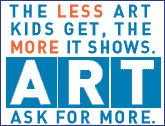| (from page 8 of NCLB) STATE PLANS: A GOLDEN OPPORTUNITY The No Child Left Behind Act requires states to develop plans to improve student achievement. The states must consult with local education agencies, teachers, administrators, parents, and other staff. Some states may have broader consultation. Clearly, this presents a golden opportunity for arts education to get in at the ground floor of the new phase of education reform. What the State Plans Require The plans must require, as in previous law, �challenging academic standards� for content and achievement in at least math and reading. However, the law also calls for science standards, beginning in the 2005-06 school year, and allows for standards in other subjects as determined by the states. The vast majority of states have such standards in the arts. State plans must also require yearly assessments in math and reading for grades 3-8 beginning in 2005-06, and beginning in 2007-08, science assessments for grades 3-5, 6-9, and 10-12. At the states� discretion, students may be measured in other academic subjects. States may use a variety of other indicators to assess progress. They will have to provide information to the U.S. Department of Education on their science, reading, and math results, but they may provide other information as well. Plans must include �sanctions and rewards� to ensure that schools make �adequate yearly progress� which is based at a minimum on math, reading and science. Failure to meet the requirements of the No Child Left Behind Act may entail loss of funds for administering federal programs. The U.S. Department of Education�s website includes further information about the adequate yearly progress requirements at www.ed.gov/nclb. As of June 2003 every state, Puerto Rico, and the District of Columbia have in place new accountability plans. Links to each state plan are available on the U.S. Department of Education website , here: www.ed.gov/admins/lead/account/stateplans03. Clearly, implementation and fine-tuning will continue. Even though preliminary plans have been approved, seek opportunities to participate in the ongoing planning process at the state and local level. What to Recommend to State Planners From the standpoint of the arts, the plans present many opportunities. At a minimum, arts educators can urge state and local policymakers to � Encourage states to consider assessments in the arts as part of their accountability systems, developing either state assessments or requiring local districts to so. Also include the arts, as appropriate, in both the content standards and assessments in math, reading, and science. To find the status of arts standards and assessments in your state, visit the Arts Education Partnership�s 2003- 2004 State Arts Education Policy Database (www.aeparts. org/policysearch/searchengine). Also learn more about: the national math standards (www.nctm.org/standards); the national science standards (www.nap.edu/books/0309053269/html/index.html); and the national language arts standards (www.ncte.org). � Use open response questions in assessments of student progress. This type of assessment requires the ability to solve problems and think critically, abilities that |

|
| THE ART ROOM |


